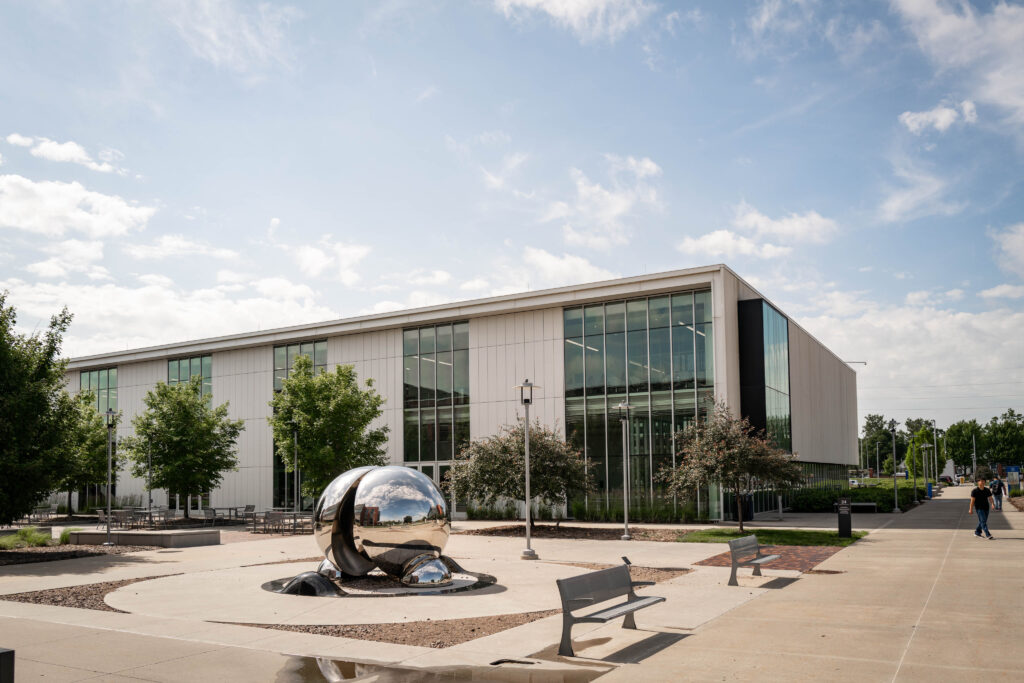Bob Benzel had quite a few people on his mind in 2019.
The students who the former Ralston High School art teacher watched drop out after becoming pregnant.
His mother, who, in her late 30s, earned her GED and associate’s degree while raising four kids by herself.
The family friends who made their communities better, despite not having easy access to higher education.
And Benzel himself, having grown up gay on a farm outside the village of Potter.
Those people led Benzel and his husband, Gerry Sullivan, to create a fund for five scholarships at Metropolitan Community College — money they earmarked to go to single mothers, first-generation students and LGBTQ learners.
That’s who quietly benefited over the past five years. And that’s who Benzel believes will be harmed by MCC’s recent decision to eliminate scholarships with any kind of preference based on a student’s background.
Since March, MCC and other Nebraska colleges and universities have revised their guidelines for awarding scholarships in an attempt, they say, to comply with new guidance from the Trump administration. The directive instructed schools and higher-ed institutions to eliminate long-accepted practices now deemed discriminatory or risk losing federal funding.
Scrutiny isn’t coming from just the federal government. The Flatwater Free Press found that the University of Nebraska at Omaha recently removed preferential language from two scholarships that were the subject of a complaint filed by a national advocacy group that opposes affirmative action.
The funding threat has school leaders walking on eggshells, administrators and experts say.

MCC’s explanation didn’t fly with Benzel after the foundation director at the time told him they could no longer offer scholarships like the one for LGBTQ students.
Given the option to open the scholarships to all students, Benzel and Sullivan instead took their money back. They plan to donate the remaining $45,000 to a fund supporting LGBTQ students in California, where they now live.
“When do these kids get a chance to get their life together and escape poverty? And how do you get people who are constantly being pushed into life without an education? How are they ever going to get ahead?” Benzel said. “If a place like Metropolitan Community College is not actively looking out for these kids, who is?”
‘Protect the greater good’
MCC’s decision to eliminate all preferential scholarships came after Valentine’s Day, when the U.S. Department of Education sent out a “Dear Colleague” letter condemning “pervasive and repugnant race-based preferences and other forms of racial discrimination.”
The letter threatened to pull federal funding from any schools or colleges that failed to end policies and actions deemed discriminatory.
“All students are entitled to a school environment free from discrimination. The Department is committed to ensuring those principles are a reality,” the letter states.
MCC officials did not want to jeopardize federal funding or grants, which benefit a much larger number of students, said Chris Swanson, MCC’s associate vice president of pathway support systems.
“It just made sense to make these changes to protect the greater good and to serve more students as a whole,” Swanson said.
The decision impacted a minuscule number of scholarships and students, Swanson said. Through its foundation, the college offered fewer than 10 preferential scholarships. Most offered smaller dollar amounts that only partially funded a student’s education, and a few were out of funding.
MCC overall offers 200 scholarship types totaling $7 million, some $3.8 million of which comes from taxpayers. Roughly half of the college’s student body receives scholarships, Swanson said.
“On balance,” Swanson said, “we were talking about those small handfuls of things versus Title IV funding for all of our students receiving federal financial aid.”
Those students who previously received scholarships still received funding — it just came from a different source, Swanson said.
‘Scary across the board’
Multiple four-year institutions across the state have confirmed to the Flatwater Free Press that they have similarly adjusted their guidelines, including the University of Nebraska system, Chadron State College, Peru State and Wayne State College. (Correction: This story incorrectly stated Wayne State had not adjusted its guidelines. It has since been corrected.)
The University of Nebraska at Omaha, in particular, is currently facing backlash from multiple entities, including the Equal Protection Project, a campaign led by a nonprofit that opposes race-based policies.
The group filed a complaint with the Department of Education last month alleging two of the university’s scholarships violate Title VI of the Civil Rights Act of 1964, which prohibits intentional discrimination on the basis of race, color and/or national origin.
“Regardless of UNO’s reasons for offering, promoting, and administering such discriminatory scholarships, UNO is violating Title VI by doing so,” the complaint states.

UNO’s Dreamers Pathway scholarship was for Deferred Action of Childhood Arrivals (DACA) or DACA-eligible Nebraska residents. The scholarship is no longer listed on UNO’s scholarship website and the link now leads to the Forward Together scholarship for Nebraska residents.
Its HDR scholarship had a preference for underrepresented minority students at the time the complaint was filed, but UNO has since eliminated that preference from the scholarship’s language.
UNO is one of about 100 institutions across the country that have faced complaints from the group.
Separately, the Department of Education announced in March that it is investigating UNO for allegedly engaging in race-exclusionary practices in its graduate programs.
In an initial statement, university officials said they continually evaluate the university’s scholarships and are committed to complying with all federal and state laws.
They did not immediately respond to a request for additional comment Wednesday after Flatwater discovered the changes made to the two scholarships.
Dorothy Endacott, the vice president of marketing communications for the University of Nebraska Foundation, said 65, or 1%, of the foundation’s 5,697 different funds for scholarships are in the process of being modified to be as close as possible to the original intent while complying with the law.
Some had donors who were deceased, Endacott said, so the foundation either worked with the Nebraska attorney general to modify their criteria or had changes approved by the foundation’s board of directors.
National scholarships are being affected as well. McDonald’s changed its HACER National Scholarship Program in January following a settled lawsuit brought by the American Alliance for Equal Rights, a nonprofit that challenges preferences made on the basis of race and ethnicity.
The program, originally intended for Latino students, is now open to any student who can demonstrate an impact on or commitment to the Latino community.
The actions targeting UNO and other entities have caught the attention of administrators elsewhere.
“I’m nervous for our four-year counterparts, our private liberal arts institutions, in terms of positioning for higher education funding,” said Swanson at MCC. “It’s scary across the board as an industry.”
The recent moves come in the wake of a 2023 U.S. Supreme Court ruling outlawing the use of race as a factor in a college’s admissions process.
Paul Weitzel, an assistant professor of law at the University of Nebraska-Lincoln, said the Department of Education’s current interpretation of federal statutes is unprecedented because scholarships like the ones created by Benzel and Sullivan helped, not hindered, underrepresented groups.
“It’s not really clear what’s permissible or impermissible discrimination anymore,” Weitzel said. “It’s an active debate in the country right now whether you should be able to discriminate on the basis of race in a way that helps minorities.”

The debates at MCC are happening across the country, said Wil Del Pilar, the senior vice president of EdTrust, a left-leaning organization that researches and advocates for racial and economic equity in education.
Most institutions are conceding to the new administration, often more than they necessarily need to, for fear of paying for issues to go through the courts, Pilar said. Many had the same reaction to the Supreme Court’s ruling on affirmative action, he added.
“There is incredible political pressure that may even be greater than the legal ramifications that institutions may face,” Pilar said, referring to college and university leadership.
Swanson said the stakes at MCC go well beyond any single group of students. If MCC lost federal funding, it would be forced to close — a move that would carry negative consequences across Dodge, Douglas, Sarpy and Washington counties.
“The economic engine of our four-county area would crawl to (a) halt,” Swanson said. “And so I think, yes, tens of millions (of dollars) for us, but potentially hundreds of millions for our workforce area.”
While acknowledging the reasons behind MCC’s decision, Benzel said that the students his scholarships supported still need it.
He and Sullivan have since shifted their donations toward the National Rainbow College Fund, administered by a foundation in San Diego.
Benzel predicts the decisions made by MCC and others will have lasting negative impacts.
“I think it’s going to ultimately get other people to be looking at exit ramps out of Nebraska, just like we did,” he said.



12 Comments
Thank you for this very important story. Other than taking scholarship funding out of the state, are there any other ways that donors can work within the state, say with private foundations, but still get the scholarships in the hands of the underserved? I am very concerned. Please continue to update us.
These schools have a choice. Stand up and fight the loss of federal money. That does harm “the greater good”. Be like Harvard and file a lawsuit.
These schools do have a choice: continue to illegally discriminate based on national origin, sex, gender, etc., or do the right thing and wash their dirty hands from that dirty business of feel-good discrimination that was and is, DISCRIMINATION. NO H8 in our state! NOT IN MY NAME!
You know, when housing and business loans were denied to women, and brown people, it put them at a disadvantage for accumulating and handing down wealth. I took no loans for school. My dad ran a business, and invested also in my children’s education. The graduated from 4 year institutions with no debt. He bought bonds. He had an employer who shared wealth with his employees, and Dad was able to get housing loan, a managerial position, and but saving bonds. This really didn’t happen to black and brown people and women. Those who did succeed were massacred. These scholarships were the closest things to reparations for enslaving black people; killing, relocating, and committing genocide against indigenous people. I think you should re-examine all of your righteous indignation and consider the advantages you may have had due to gender and race. I would recommend reading “The Sum of Us” which is great book, about how historically white people had shot themselves in the foot to make sure they didn’t share with people of color. The book was written by someone who has worked in the federal governemt and has access to data and information. Knowledge is power. BTW, the UNO scholarships have had a profound impact on children and families in South Omaha, as well as the community. Equal Opportunity is not illegal. The current bans have been put in place by a liar and felon, not to mention an entitled person born with a silver spoon in his mouth. Did you know we had heroes in every was we fought in that were not white. Did you know there were heroes that no one acknowledged? Did you know that businesses who embrace diversity are more productive and profitable, then those that don’t. My own experience is that people who live in all white spaces are the most concerned about equity and inclusion. No hate is great. But it begins with embracing people who add social and economic value to our state, and acknowledging our history.
Yes, it’s happening in Ohio too: https://www.dispatch.com/story/opinion/columns/guest/2024/12/09/ohio-state-university-osu-scholarship-lgbtq-rural-supreme-court/76819890007/
I’m glad I didn’t see the Goodrich Scholarship program at UNO on the hit list. As a young man from a broke single mom I was one of the few white kids that got it. Most of the funds went to minorities and I don’t know if I would have went to college otherwise. I’ve been paying taxes and enjoying the benefits of that higher education ever since.
Friends of Bob & Gerry know and appreciate their many ways of community giving. They are entitled to shift their scholarship gift and it will still benefit deserving students. But it’s important for those considering supporting education in Nebraska and who value diversity and inclusion as enriching our community to understand that they can shape their contributions to support non-traditional or students facing obstacles. For example, working with the NU Foundation, we’ve established a scholarship fund aimed at helping UNO students complete their degrees. Beyond certain academic criteria, it is open to any qualifying student but with preference for students who are first generation in college and/or a parent of minor child/children and/or with demonstrated financial need. Based on letters from the recipients, they embrace a wide range of backgrounds and interests, but all demonstrate a passion for learning and giving back to their community. Nebraska’s return on investment from college graduates is substantial.
I know the University has scholarships dedicated to rural students to address what they see is the need for such things as lawyers and medical providers in rural areas.
Are they on the chopping block too?
Under Title IX, it was and remains illegal to discriminate based on national origin (i.e., DACA status, immigration status, foreign born parents, et al.). The fact is, is that these colleges have illegally discriminated for years, and it ‘s time that they complied with the law. It’s fine if some non-college affiliated group wants to give scholarships based on race, sex, gender, or national origin, but its SHAMEFUL for the colleges themselves to be involved. SHAME ON THESE COLLEGES FOR TAKING SO LONG to do the RIGHT THING!
Imagine if MCC (or any other of these aforementioned colleges) was administering a scholarship aimed at straight white males, funded by say, White Guys, Inc. . The outcry about discrimination would be immediate, or more likely, MCC would never agree to offer the scholarship.
It it well past the time that MCC and UNO and the rest STOP discriminating, and administer scholarships WITHOUT regard to national origin, sex, gender status, DACA status, et al. Feel good discrimination is still, discrimination. NO H8 in OUR STATE!
Well done!
Help me understand why LGBTQ students are considered underserved. Also why do you have to be any color but white to be considered undeserved. There are many white students who are living in poverty and underserved as well. The idea is to make sure ALL underserved students have equal opportunities. So what is the problem, the scholarships weren’t taken away they are just being restricted from being given only to non whites.